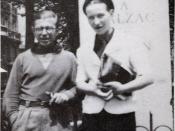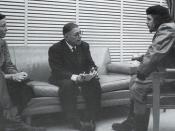Communication as Philosophical Perspective of the 20th CenturyPrior to the dawn of the 20th century, almost all facets of the existence of humankind have been touched by philosophy, such as medicine, history, logic, literature, feminism, politics, war, theology, the natural sciences and even health. While these aspects prove to be of notable value to humankind, it need not be mentioned that virtually all were grossly overemphasized. For instance, the 20th century was indeed the turning point in the field of medicine as philosophical perspective, as medicine evolved into virtual magic, as philosophies turned into medical concepts, which in turn precipitated toiling of technology which led eventually to breakthroughs.
Often overlooked is the field of communication, which was one of the prevailing philosophical perspectives that subtly thrived in the 20th century. Yes, subtly, because when compared to the other philosophical perspectives, the facets of communication such as linguistics, phonetics and sociolinguistics and the connection within the world tremendously improved.
One of the leading philosophers who played a key role in the development of communication as a philosophical perspective was the English philosopher Peter Frederick Strawson. Strawson solidified his claims through his work, the Logico-linguistic Papers, in which he stated the utter importance of communication and language, which were always overlooked in favor of the more "important" fields. In the standpoint of Strawson, nothing will thrive in the world if it were not for communication and the tidbits that comprise it; it made profound sense, for in every given perspective that his ideas are going to be looked at and pondered upon, they all come down to the most basic of principles. Nothing can be gained without language. Theories could not be formulated by thought alone; messages could not be conveyed by call alone; because all the means needed to state...


